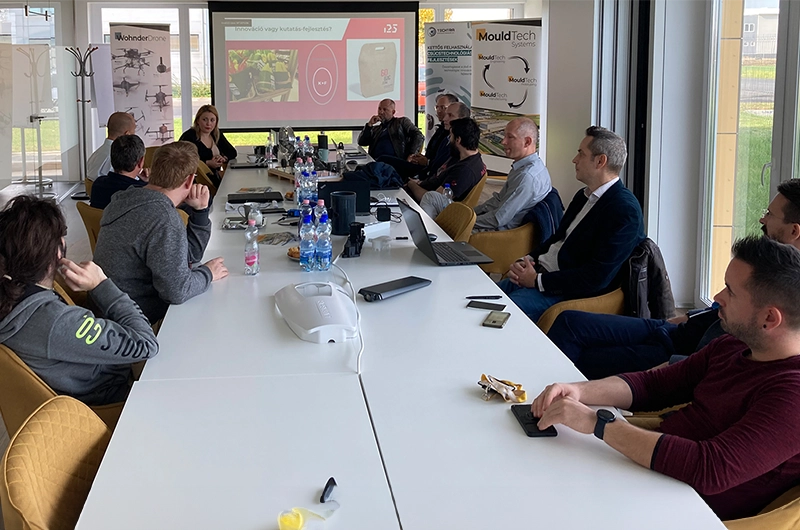On November 11th, a workshop was held at the MouldTech headquarters in Zalaegerszeg, focusing on patenting practices and the future outlook in Hungary. Participants included ZalaZONE Research & Innovation and WohnderDrone. The event was organized with the collaboration of the Techtra Technology Transfer Institute.
Basic research, applied research and experimental development
MouldTech held an intellectual property protection workshop at its Zalaegerszeg headquarters, focusing on patenting practices. The event hosted representatives from several local businesses at the invitation of the host, including developers from ZalaZONE Research & Innovation and WohnderDrone. The event was organized by Huszti Levente from the Techtra Technology Transfer Institute.
The workshop featured several professional presentations. Following introductions, Katalin Szmollár, Head of the Innovation Support Department at the Intellectual Property Office of Hungary (SzTNH), welcomed the participants. Szmollár highlighted ongoing transformations in Hungary's innovation ecosystem, noting changes in funding for higher education institutions and a more supportive regulatory environment fostering innovation domestically. She emphasized the importance of assisting companies, particularly in understanding the complex process of patenting. SzTNH aims to ensure that every small and medium-sized enterprise (SME) understands their operations and the support available in this evolving ecosystem.
Afterwards, Szmollár discussed the benefits of R&D (research and development) qualification. R&D qualification can provide effective support for all SMEs. As an example, she mentioned significant tax incentives available for their activities. Following this, the speaker turned to the central topic of her presentation: building innovation and branding through funding from grants. Szmollár outlined three fundamental concepts often confused by industrial players: basic research, applied research, and experimental development. She emphasized that these three concepts form a cohesive process, which unfortunately often stops at basic research or, at best, applied research here in Hungary.
Following this, the Head of the Innovation Support Department at SzTNH outlined the R&D criteria that SMEs must meet if they wish to apply. She emphasized that the two most important criteria are novelty and uncertainty in the research area, as well as being based on creative activities, systematic research conduct, and the ability to reproduce research results. (SzTNH evaluates whether the SME project meets these criteria based on the Frascati Manual.) The organization provides preliminary qualification to the SME after application, indicating what changes need to be made. Subsequently, a final qualification is granted based on expert opinion, which is a legal obligation and determines whether the SME can receive the qualification.
Szmollár highlighted that even companies not primarily focused on R&D often receive support. For instance, a small business dealing with dried fruits once received such qualification because during their everyday operations, they discovered a packaging method that extends the freshness of fruits.
Intellectual property protection
It was emphasized, however, that filing for R&D activities is just the beginning. To obtain a patent for an SME's product, an additional six-month waiting period is required, during which detailed and meticulous data must be provided about the product intended for patenting. Szmollár encouraged everyone to pursue patenting and even trademark registration despite the slow, cautious, and bureaucratic process, highlighting the significant trust value for consumers. As an example, she mentioned the trademarked brand of Coca-Cola, which stands out among numerous other brands. She also suggested that every company should undergo what is called an intellectual property audit to assess what intellectual assets can be protected by the SME.
Intellectual property (IP) is also significantly important from an accounting perspective. In more advanced markets, up to 90% of a company's valuation consists of patents, designs, brands, software, professional skills, and know-how mechanisms. A properly managed IP portfolio is thus an investment rather than unnecessary expenditure, a misconception often held by owners. As an example, she mentioned Apenta, the oldest Hungarian brand, which has exclusively owned its company name and appearance since 1899, ensuring consumers that wherever their mark appears, it consistently delivers the same quality.
Open Factories Night
Following the patenting workshop, MouldTech prepared another event for the guests. On November 11th, starting from 6 PM, they hosted the "Open Factories Night" (Nyitott Gyárak Éjszakája or NyGyÉ). During NyGyÉ, guests, along with external visitors, participated in a 1.5-hour guided tour of MouldTech's factory and innovation center. They had the opportunity to observe the company's development processes firsthand. Additionally, experienced pilots assisted guests in flying drones directly adjacent to ZalaZONE, showcasing practical applications.
16. 11. 2022.

